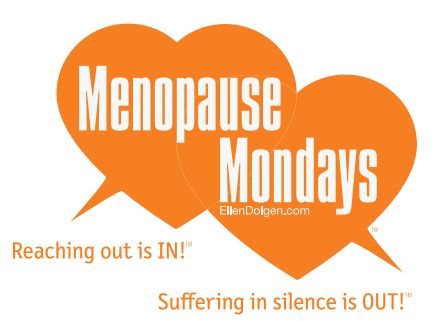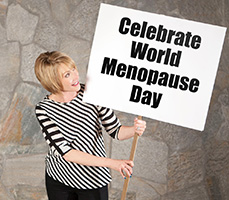
Ladies, we deserve to have the best sex of our lives -- now! Even better, it's completely doable (pun intended). During our menopausal years, our sex lives have so much from which they can benefit: a strong sense of self, deep relationships, and bodies we actually know how to use!
For women, sex is like a fine wine. It gets better with age! Research published in the American Journal of Medicine shows that women's sexual satisfaction actually tends to increase with age -- even despite the hormonal throes of menopause.

Why? "As we age, most of us become more aware of what we need in the bedroom and how to get there. We feel more deserving of sexual pleasure and are more willing to ask for what we want from our partners," says Hilda Hutcherson, M.D. Clinical Professor of Obstetrics and Gynecology at Columbia University Medical Center and author of Pleasure: A Woman's Guide to Getting the Sex You Want, Need and Deserve. "In our 50s we are more likely to focus on our pleasure than in our 20s, when we tend to focus almost exclusively on his experience."
What's more, knowing exactly what you want come bedtime can make sex better for him as well! One study from Kwantlen Polytechnic University in British Columbia found that the more you focus on your own pleasure during sex, the more satisfied both you and your partner will be. The reason: When you are selfish in the sack, your partner doesn't have to worry that you're not enjoying yourself--he can see that you are! Be greedy and both of you will have better sex? Yes, please!
So if your current sex isn't the best you've ever had, it's time to do something about it. After all, you do have hormonal changes to contend with.
"Women may first notice sexual changes during the perimenopausal stage, which can begin up to 10 years before your very last period, or menopause. That means that some women will begin to have symptoms of decreasing estrogen in their mid-late 30s or early 40s," Dr. Hutcherson says. "The first sexual complaint is often painful sex due to vaginal dryness."
A silent symptom of menopause, vaginal dryness occurs in up to one-half of postmenopausal women, while about one-third of postmenopausal women suffer from pain during sex, according to a 2009 review by Susan Wysocki, WHNP, FAANP, president at iWoman's Health.
"Estrogen is needed to keep your vagina moist, plush, and stretchable. When estrogen is low, women may notice vaginal dryness, which can lead to painful sex," says Dr. Hutcherson. Dry estrogen reserves = dry vagina. Plagued by thinning walls and painful inflammation, a dry vagina can make a woman feel anything but empowered. Even worse, fragile vaginal walls can suffer small tissue tears during sex that can lead to intense pain and bloody sheets.
It's important to remember that declining estrogen levels is one of many potential problems standing in between you and the best sex of your life. In fact, according to a review published in Pain Research and Management, in some postmenopausal women, low levels of estrogen aren't the cause of painful intercourse, suggesting that other sex-wreckers such as endometriosis, pelvic inflammatory disease, uterine fibroids, and even stress (what woman doesn't have that!?) are compounding the problem. Basically, anything that zaps your sexual desire can decrease vaginal lubrication, potentially making sex painful, according to Mayo Clinic.
"Medical problems and medications certainly can wreak havoc on desire," Dr. Hutcherson says. Certain meds--including antidepressants, blood pressure medications, and some allergy and cold drugs--can slash your sexual desire.
But the most common reason for a lack of libido? "Boredom. Women simply become bored with their sex lives after a time with the same partner. Sex becomes routine, same time, same place, same position, etc.," she says.
Here is how to get sexually empowered -- and yes, even greedy -- for better between-the-sheets bliss:
Take Responsibility for Your Own Orgasm
"First, women need to decide that they are deserving of pleasure. Then they need to accept the fact that each woman is responsible for her own sexual pleasure. That means that she must discover, on her own, what feels good. She can't wait for the 'magic finger or penis' to ride along on a white horse and bring her sexual ecstasy! Once she discovers what works, she must then show her partner and expect that the partner will work with her to make sure that she is sexually satisfied," Dr. Hutcherson says.
Stop Faking It, Already!
"Faking orgasms will guarantee that your sex life with your partner never improves. Your partner becomes convinced that he is providing everything that you need for complete sexual satisfaction. So they keep doing the same thing and achieving the same results -- that you are not satisfied," Dr. Hutcherson says. "Let your partner know what you desire and need for complete satisfaction." Being honest (not mean!) increases the chances of a fulfilling sex life for both of you.
Listen to Your Vagina
If you find that you're all lubed up and sex is still "meh," it's time to find -- and treat -- the root cause of any pain. Take note (literally -- go grab a notepad!) of your below-the-belt symptoms including dryness, itching, burning, painful sex, and bleeding, their severity, and what has and hasn't worked to relieve them. Bring your symptoms list with you to your perimenopause and menopause specialist to discuss. Your doctor can even perform a quick examination on the spot to pinpoint the problem. If low estrogen is to blame, treatment options include systemic estrogen therapy, local estrogen therapy (LET), over-the-counter moisturizers, or a combo of these options, according to vaginaldiscomfort.com. Remember: There is no one-size-fits-all solution for vaginal dryness and painful intercourse. Every vagina is unique.
If you don't have a menopause specialist, consult my Menopause Doctor Directory, check out the menopause specialists listed on the North American Menopause Society website, request a referral from any great doctors you know, or ask your friends who is helping them to find hormone happiness.
Stop acting like sex is something polite ladies don't talk about. Sex is a foundation of who we are as women, as lovers, and as mothers. So let's shout (you know what!) from the rooftops! Plus, it just feels amazing! So go get yours and really have something to celebrate this World Menopause Day! (Mark your calendars--it's October 18!) It's time to show the world (and our sex lives) what menopause should really feel like!
Reaching out is IN! Suffering in silence is OUT!
For more by Ellen Dolgen, click here.
For more on women's health, click here.
Ellen Dolgen is an outspoken women's health and wellness advocate, menopause awareness expert, author, and speaker.
After struggling through the silence that surrounds menopause, Ellen resolved to help women reach out and end the confusion, embarrassment, and less-than-lovely symptoms that come with "the change." Her passion to be a "sister" to all women fueled Ellen's book, Shmirshky: the pursuit of hormone happiness. As a result of her women's wellness journey, and in response to the overwhelming thirst of her ever-expanding audience for empowering information, Ellen's weekly blog, Menopause Mondays was born.
Menopause Mondays allows Ellen an expansive platform from which she broadens her discussion of menopause, women's health, and life as a menopausal (and fabulous!) woman. Her weekly Menopause News Flash provides a one-stop shop for the latest menopause and women's health news and research, allowing women the access and know-how needed to take charge of their health and happiness. In addition to Ellen's ever-growing social media presence, EllenDolgen.com has fast become "the place" on the web for informative and entertaining women's menopause and wellness engagement. Ellen is #1 on Dr. Oz Sharecare.com Top 10 Social HealthMakers on Menopause. In 2012 and 2013 EllenDolgen.com was named first on the list of the "Best Menopause Blogs" by Healthline. Ellen is also a regular contributor to over a dozen leading women's health blogs. Her motto is: Reaching out is IN! Suffering in silence is OUT!
Ellen has appeared on the "TODAY Show," "NBC Nightly News", the "Rachael Ray Show," "The Doctors," Oprah Radio, Playboy Radio, NPR's "Tell Me More," Doctor Radio, and dozens of regional and national media outlets. In 2011 she appeared in a sold-out, San Diego production of "The Vagina Monologues." Ellen was one of the first regular contributors to debut on The Huffington Post's, Huff/Post50, which targets 116 million Americans over the age of 50.
Like Ellen Dolgen on Facebook, follow her on Twitter and Pinterest, connect with her on LinkedIn, Google+, and Klout, watch her videos on YouTube, and subscribe to her newsletter.
Earlier on Huff/Post50:
